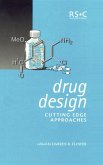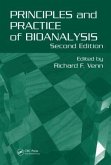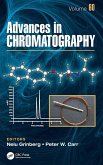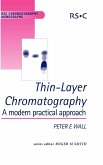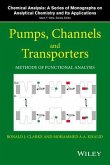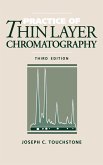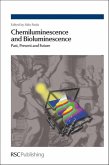Thin Layer Chromatography in Drug Analysis
Herausgeber: Komsta, Lukasz; Sherma, Joseph; Waksmundzka-Hajnos, Monika
Schade – dieser Artikel ist leider ausverkauft. Sobald wir wissen, ob und wann der Artikel wieder verfügbar ist, informieren wir Sie an dieser Stelle.
Thin Layer Chromatography in Drug Analysis
Herausgeber: Komsta, Lukasz; Sherma, Joseph; Waksmundzka-Hajnos, Monika
- Gebundenes Buch
- Merkliste
- Auf die Merkliste
- Bewerten Bewerten
- Teilen
- Produkt teilen
- Produkterinnerung
- Produkterinnerung
An up-to-date, complete reference, this book covers the most important methods in pharmaceutical applications of TLC, namely, analysis of bulk drug material and pharmaceutical formulations, degradation studies, analysis of biological samples, optimization of the separation of drug classes, and lipophilicity estimation. Part I is devoted to general topics related to TLC in the context of drug analysis. Part II provides an in-depth overview of a wide range of TLC applications for separation and analysis of particular drug groups.
Andere Kunden interessierten sich auch für
![Drug Design Drug Design]() FlowerDrug Design126,99 €
FlowerDrug Design126,99 €![Principles and Practice of Bioanalysis Principles and Practice of Bioanalysis]() Principles and Practice of Bioanalysis163,99 €
Principles and Practice of Bioanalysis163,99 €![Advances in Chromatography Advances in Chromatography]() Advances in Chromatography154,99 €
Advances in Chromatography154,99 €![Thin-Layer Chromatography Thin-Layer Chromatography]() Peter WallThin-Layer Chromatography146,99 €
Peter WallThin-Layer Chromatography146,99 €![Pumps, Channels and Transporters Pumps, Channels and Transporters]() Pumps, Channels and Transporters147,99 €
Pumps, Channels and Transporters147,99 €![Practice of Thin Layer Chromatography Practice of Thin Layer Chromatography]() Joseph C TouchstonePractice of Thin Layer Chromatography292,99 €
Joseph C TouchstonePractice of Thin Layer Chromatography292,99 €![Chemiluminescence and Bioluminescence Chemiluminescence and Bioluminescence]() Chemiluminescence and Bioluminescence176,99 €
Chemiluminescence and Bioluminescence176,99 €-
-
An up-to-date, complete reference, this book covers the most important methods in pharmaceutical applications of TLC, namely, analysis of bulk drug material and pharmaceutical formulations, degradation studies, analysis of biological samples, optimization of the separation of drug classes, and lipophilicity estimation. Part I is devoted to general topics related to TLC in the context of drug analysis. Part II provides an in-depth overview of a wide range of TLC applications for separation and analysis of particular drug groups.
Produktdetails
- Produktdetails
- Verlag: CRC Press
- Seitenzahl: 1067
- Erscheinungstermin: 31. Dezember 2013
- Englisch
- Abmessung: 261mm x 184mm x 60mm
- Gewicht: 1971g
- ISBN-13: 9781466507159
- ISBN-10: 1466507152
- Artikelnr.: 38021701
- Herstellerkennzeichnung
- Libri GmbH
- Europaallee 1
- 36244 Bad Hersfeld
- gpsr@libri.de
- Verlag: CRC Press
- Seitenzahl: 1067
- Erscheinungstermin: 31. Dezember 2013
- Englisch
- Abmessung: 261mm x 184mm x 60mm
- Gewicht: 1971g
- ISBN-13: 9781466507159
- ISBN-10: 1466507152
- Artikelnr.: 38021701
- Herstellerkennzeichnung
- Libri GmbH
- Europaallee 1
- 36244 Bad Hersfeld
- gpsr@libri.de
¿ukasz Komsta currently serves as assistant professor in the Department of Medicinal Chemistry, Faculty of Pharmacy, Medical University of Lublin, Poland. His research interests include the theory and application of liquid chromatography, especially in connection with computational chemistry and chemometrics, as well as the application of chromatographic methods, especially thin layer chromatography (TLC), in the analysis of drugs. Dr. Komsta is the author or coauthor of more than 80 scientific papers and about 70 scientific conference papers. Since 2011, he has been a member of the editorial board of the journal Acta Chromatographica. He also serves as section editor for the Polish scientific journal Current Issues in Pharmacy and Medical Sciences. Monika Waksmundzka-Hajnos currently serves as full professor of pharmacy and head of the Department of Inorganic Chemistry at the Faculty of Pharmacy of the Medical University of Lublin, Poland. Her research interests include the theory and application of liquid chromatography, taking into consideration the optimization of chromatographic systems for the separation and quantitation of drugs and their degradation products in pharmaceutical preparations and drugs and their metabolites in body fluids, as well as isolation and/or separation of secondary metabolites in extracts of plant tissues. Professor Waksmundzka-Hajnos is the author or coauthor of about 150 papers, approximately 300 conference papers, and several chapters in known chromatographic textbooks. She is editor of the journal Acta Chromatographica and a member of the editorial board of Journal Planar Chromatography - Modern TLC. Since 2011, she has been a member of the editorial board of The Scientific World Journal-Analytical Chemistry. Professor Waksmundzka-Hajnos is the co-editor of two books from the Chromatographic Science Series: Thin-Layer Chromatography in Phytochemistry (2008, with Teresa Kowalska and Joseph Sherma) and High Performance Liquid Chromatography in Phytochemical Analysis (2010, with Joseph Sherma). Joseph Sherma is currently John D. and Francis H. Larkin Professor Emeritus of Chemistry at Lafayette College, Easton, Pennsylvania. Professor Sherma has authored, coauthored, edited, or coedited more than 750 publications, including research papers and review articles in peer- reviewed journals; approximately 30 invited book chapters; and more than 70 books and U.S. government agency manuals in the areas of analytical chemistry and chromatography. In addition to his research in the techniques and applications of thin layer chromatography, Professor Sherma has a very productive interdisciplinary research program in the use of analytical chemistry to study biological systems with Biology Professor Emeritus Bernard Fried. Professor Sherma served for 23 years as editor for residues and trace elements of the Journal of AOAC International and is currently that journal's Acquisitions Editor.
Part I Theory of Thin Layer Chromatography in Context of Pharmaceutical
Analysis. Overview of Drug Analysis and Structure of the Book. Chemistry of
Drugs and Its Influence on Retention. Sorbents and Layers Used in Drug
Analysis. Optimization of Mobile Phase Composition. Chromatographic
Analysis of Ionic Drugs. Ionic Liquid Additives to Mobile Phases.
Chromatographic Analysis of Chiral Drugs. Chambers, Sample Application, and
New Devices in the Chromatography of Drugs. 2D Planar Chromatography.
Quantitative Detection of Drugs by Densitometry and Video Scanning.
Statistical Evaluation and Validation of Quantitative Methods of Drug
Analysis. Detection and Identification in TLC Drug Analysis. TLC
Determination of Drug Lipophilicity. Screening of Substandard and Fake
Drugs in Underdeveloped Countries by TLC. Part II Planar Chromatography of
Particular Drug Groups. TLC of Antidepressants and Neuroleptics. TLC of
Anxiolytics and Sedatives. TLC of Morphine Analogs. TLC of Nonopioid
Analgesics, Anti-Inflammatics, and Antimigraine Drugs. TLC of Ergot
Alkaloid Derivatives. Thin-Layer Chromatography of Anesthetics. TLC of
Psychostimulants. TLC of Antiepileptics. TLC of Alzheimer's Disease
Medicines. TLC of Antiparkinsonians. Thin-Layer Chromatography of Cardiac
Drugs. TLC of Antihypertensive and Antihypotensive Drugs. TLC of
Beta-Blockers and Beta-Agonists. TLC of Antithrombotics. TLC of
Antihyperlipidemics. TLC of Spasmolytics. TLC of Mucolytic, Antitussive,
and Antiasthmatic Drugs. TLC of Neuromuscular Blockers. TLC of Antiulcers.
TLC of Antiemetic Drugs. TLC of Steroids and Analogs. TLC of Drugs Used in
Obesity and Sexual Dysfunction Treatment. TLC of Prostaglandins. TLC of
Diuretics. TLC of Antidiabetics. TLC of Antihistamines. TLC of Vitamins
Including Nicotinic Acid Derivatives. TLC of Antiseptics. TLC of
Sulfonamides. TLC of Quinolones. Thin-Layer Chromatography of
Tuberculostatic Drugs. TLC of Antifungal and Antiprotozoal Drugs. TLC of
ß-Lactam Antibiotics. TLC of Other Antibiotics. Thin-Layer Chromatography
of Antiviral Drugs. Thin-Layer Chromatography of Anticancer Drugs.
Uncertainty Factors in the Enantioseparation of Chiral Drugs on Silica Gel
Layers. Index.
Analysis. Overview of Drug Analysis and Structure of the Book. Chemistry of
Drugs and Its Influence on Retention. Sorbents and Layers Used in Drug
Analysis. Optimization of Mobile Phase Composition. Chromatographic
Analysis of Ionic Drugs. Ionic Liquid Additives to Mobile Phases.
Chromatographic Analysis of Chiral Drugs. Chambers, Sample Application, and
New Devices in the Chromatography of Drugs. 2D Planar Chromatography.
Quantitative Detection of Drugs by Densitometry and Video Scanning.
Statistical Evaluation and Validation of Quantitative Methods of Drug
Analysis. Detection and Identification in TLC Drug Analysis. TLC
Determination of Drug Lipophilicity. Screening of Substandard and Fake
Drugs in Underdeveloped Countries by TLC. Part II Planar Chromatography of
Particular Drug Groups. TLC of Antidepressants and Neuroleptics. TLC of
Anxiolytics and Sedatives. TLC of Morphine Analogs. TLC of Nonopioid
Analgesics, Anti-Inflammatics, and Antimigraine Drugs. TLC of Ergot
Alkaloid Derivatives. Thin-Layer Chromatography of Anesthetics. TLC of
Psychostimulants. TLC of Antiepileptics. TLC of Alzheimer's Disease
Medicines. TLC of Antiparkinsonians. Thin-Layer Chromatography of Cardiac
Drugs. TLC of Antihypertensive and Antihypotensive Drugs. TLC of
Beta-Blockers and Beta-Agonists. TLC of Antithrombotics. TLC of
Antihyperlipidemics. TLC of Spasmolytics. TLC of Mucolytic, Antitussive,
and Antiasthmatic Drugs. TLC of Neuromuscular Blockers. TLC of Antiulcers.
TLC of Antiemetic Drugs. TLC of Steroids and Analogs. TLC of Drugs Used in
Obesity and Sexual Dysfunction Treatment. TLC of Prostaglandins. TLC of
Diuretics. TLC of Antidiabetics. TLC of Antihistamines. TLC of Vitamins
Including Nicotinic Acid Derivatives. TLC of Antiseptics. TLC of
Sulfonamides. TLC of Quinolones. Thin-Layer Chromatography of
Tuberculostatic Drugs. TLC of Antifungal and Antiprotozoal Drugs. TLC of
ß-Lactam Antibiotics. TLC of Other Antibiotics. Thin-Layer Chromatography
of Antiviral Drugs. Thin-Layer Chromatography of Anticancer Drugs.
Uncertainty Factors in the Enantioseparation of Chiral Drugs on Silica Gel
Layers. Index.
Part I Theory of Thin Layer Chromatography in Context of Pharmaceutical
Analysis. Overview of Drug Analysis and Structure of the Book. Chemistry of
Drugs and Its Influence on Retention. Sorbents and Layers Used in Drug
Analysis. Optimization of Mobile Phase Composition. Chromatographic
Analysis of Ionic Drugs. Ionic Liquid Additives to Mobile Phases.
Chromatographic Analysis of Chiral Drugs. Chambers, Sample Application, and
New Devices in the Chromatography of Drugs. 2D Planar Chromatography.
Quantitative Detection of Drugs by Densitometry and Video Scanning.
Statistical Evaluation and Validation of Quantitative Methods of Drug
Analysis. Detection and Identification in TLC Drug Analysis. TLC
Determination of Drug Lipophilicity. Screening of Substandard and Fake
Drugs in Underdeveloped Countries by TLC. Part II Planar Chromatography of
Particular Drug Groups. TLC of Antidepressants and Neuroleptics. TLC of
Anxiolytics and Sedatives. TLC of Morphine Analogs. TLC of Nonopioid
Analgesics, Anti-Inflammatics, and Antimigraine Drugs. TLC of Ergot
Alkaloid Derivatives. Thin-Layer Chromatography of Anesthetics. TLC of
Psychostimulants. TLC of Antiepileptics. TLC of Alzheimer's Disease
Medicines. TLC of Antiparkinsonians. Thin-Layer Chromatography of Cardiac
Drugs. TLC of Antihypertensive and Antihypotensive Drugs. TLC of
Beta-Blockers and Beta-Agonists. TLC of Antithrombotics. TLC of
Antihyperlipidemics. TLC of Spasmolytics. TLC of Mucolytic, Antitussive,
and Antiasthmatic Drugs. TLC of Neuromuscular Blockers. TLC of Antiulcers.
TLC of Antiemetic Drugs. TLC of Steroids and Analogs. TLC of Drugs Used in
Obesity and Sexual Dysfunction Treatment. TLC of Prostaglandins. TLC of
Diuretics. TLC of Antidiabetics. TLC of Antihistamines. TLC of Vitamins
Including Nicotinic Acid Derivatives. TLC of Antiseptics. TLC of
Sulfonamides. TLC of Quinolones. Thin-Layer Chromatography of
Tuberculostatic Drugs. TLC of Antifungal and Antiprotozoal Drugs. TLC of
ß-Lactam Antibiotics. TLC of Other Antibiotics. Thin-Layer Chromatography
of Antiviral Drugs. Thin-Layer Chromatography of Anticancer Drugs.
Uncertainty Factors in the Enantioseparation of Chiral Drugs on Silica Gel
Layers. Index.
Analysis. Overview of Drug Analysis and Structure of the Book. Chemistry of
Drugs and Its Influence on Retention. Sorbents and Layers Used in Drug
Analysis. Optimization of Mobile Phase Composition. Chromatographic
Analysis of Ionic Drugs. Ionic Liquid Additives to Mobile Phases.
Chromatographic Analysis of Chiral Drugs. Chambers, Sample Application, and
New Devices in the Chromatography of Drugs. 2D Planar Chromatography.
Quantitative Detection of Drugs by Densitometry and Video Scanning.
Statistical Evaluation and Validation of Quantitative Methods of Drug
Analysis. Detection and Identification in TLC Drug Analysis. TLC
Determination of Drug Lipophilicity. Screening of Substandard and Fake
Drugs in Underdeveloped Countries by TLC. Part II Planar Chromatography of
Particular Drug Groups. TLC of Antidepressants and Neuroleptics. TLC of
Anxiolytics and Sedatives. TLC of Morphine Analogs. TLC of Nonopioid
Analgesics, Anti-Inflammatics, and Antimigraine Drugs. TLC of Ergot
Alkaloid Derivatives. Thin-Layer Chromatography of Anesthetics. TLC of
Psychostimulants. TLC of Antiepileptics. TLC of Alzheimer's Disease
Medicines. TLC of Antiparkinsonians. Thin-Layer Chromatography of Cardiac
Drugs. TLC of Antihypertensive and Antihypotensive Drugs. TLC of
Beta-Blockers and Beta-Agonists. TLC of Antithrombotics. TLC of
Antihyperlipidemics. TLC of Spasmolytics. TLC of Mucolytic, Antitussive,
and Antiasthmatic Drugs. TLC of Neuromuscular Blockers. TLC of Antiulcers.
TLC of Antiemetic Drugs. TLC of Steroids and Analogs. TLC of Drugs Used in
Obesity and Sexual Dysfunction Treatment. TLC of Prostaglandins. TLC of
Diuretics. TLC of Antidiabetics. TLC of Antihistamines. TLC of Vitamins
Including Nicotinic Acid Derivatives. TLC of Antiseptics. TLC of
Sulfonamides. TLC of Quinolones. Thin-Layer Chromatography of
Tuberculostatic Drugs. TLC of Antifungal and Antiprotozoal Drugs. TLC of
ß-Lactam Antibiotics. TLC of Other Antibiotics. Thin-Layer Chromatography
of Antiviral Drugs. Thin-Layer Chromatography of Anticancer Drugs.
Uncertainty Factors in the Enantioseparation of Chiral Drugs on Silica Gel
Layers. Index.


